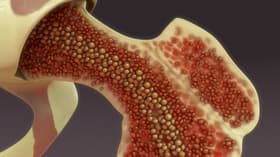RNA therapies are emerging as a promising treatment for cancer, but some types
of the disease don’t respond well to it. Now, scientists at Tel Aviv University have
demonstrated a way to use RNA drugs to treat multiple myeloma, a hard-to-reach
cancer that forms deep in bone tissue.
Multiple myeloma is a cancer that affects a patient’s plasma cells. As these important
immune cells become cancerous, they accumulate in the bone marrow, causing pain
and immune issues. While the disease can be managed, it can’t currently be cured,
thanks largely to the difficulty in getting drugs to the tumors inside the patient’s bones.
For the new study, the Tel Aviv researchers have demonstrated a promising new technique. It involves an RNA-based drug, part of a field that’s beginning to gain traction against cancer. The active ingredients are what are called small interfering RNA (siRNA) molecules, which silence the action of a target gene and stop it producing its protein.
In this case, the RNA targets a gene capped CKAP5, and without the corresponding protein the cells are unable to divide any longer. To ensure this deadly effect only applies to the cancer, the lipid nanoparticles that carry the drug are coated with antibodies that only latch onto structures on the multiple myeloma cancer cells.
The Tel Aviv team tested the technique on multiple myeloma cancer cells in several different configurations. In a batch of lab-grown cells, the nanoparticles eradicated about 90% of them. Next, they tested the therapy on cancer cells from multiple myeloma patients, and successfully cleared 60% of them. Finally, they administered the drug to mice with the disease, which eradicated around 66% of their cancer cells, with significant improvements to their symptoms.
While there’s still plenty of work left to do before human trials could be conducted, the team says these early results are promising.
“The drug delivery system we developed is the first that specifically targets cancer cells inside the bone marrow, and the first to show that silencing the expression of CKAP5 gene can be used to kill blood cancer cells,” said Dana Tarab-Ravski, first author of the study.
*
* The research was published in the journal Advanced Science.
Source: Tel Aviv University

